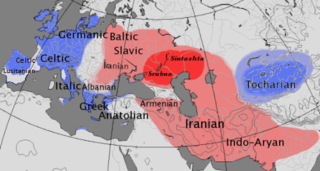Top Qs
Timeline
Chat
Perspective
Tocharian A
Extinct Indo-European language in Asia From Wikipedia, the free encyclopedia
Remove ads
Tocharian A, also known as Tokharian A, Eastern Tocharian, Agnean (tkaṃ),[6] Karashahrian or Turfanian[1] is a dead language that was in use in the 1st millennium AD in the Karashahr and Turfan region of the Tarim Basin, present-day Xinjiang, Western China. First discovered from Buddhist texts dating back to around the 7th century AD,[7] it coexisted with a related language, Tocharian B that together possibly with Tocharian C form the Tocharian branch of the Indo-European languages. This language was notably used in what China's Han dynasty then called the Kiu-che Kingdom (known as the Kushan Empire).[8] It is believed that Tocharian A died out with the other Tocharian languages when the Uyghurs and the Yenisei Kyrgyz moved into the Tarim Basin.[9]
Remove ads
Writing
Tocharian A is known from around the 2000 manuscripts found.[10] From these series of texts which are majority Buddhist liturgical texts are transcribed in a script derived from Brahmi. Unlike Tocharian B, there are no secular texts in Tocharian A. One possible explanation is that at the time these texts were written, Tocharian A survived only as a liturgical language and Tocharian B would still have been a living language.[9]
Another hypothesis, however, is that this absence is simply explained by the very fragmentary attestation of Tocharian languages in general.
From the work of Georges-Jean Pinault and Melanie Malzahn in 2007, it is now recognized that it was also a living, spoken language.[11]
Remove ads
Morphology
Nouns
The Tocharian A word for horse (yuk) is declined as follows:[12]
Pronunciation
One of the innovations of Tocharian A is the presence of a sibilant consonant ṣ.[13]
Remove ads
Tocharian Glossary
Summarize
Perspective
Tocharian Words
The following are some examples of Tocharian A words with English words:[14]
The following is also a comparison of some numbers in Tocharian A and other Indo-European languages:[15]
Maitreyasamitināṭaka

The Maitreyasamitināṭaka is a Buddhist drama about the life of the Maitreya written in Tocharian A and is the most well-known Tocharian text about Maitreya.[16] It was translated into Old Uyghur (which is named Maitrisimit), which has been used to interpret Tocharian A. The Maitrisimit is not an exact translation as it was adapted to meet the requirements of Old Uyghur and the Maitreyasamitināṭaka was written in the campū style, which has a mixture prose and verse.[17]
The following is one of the translations of the Tocharian A manuscript of Maitreyasamitināṭaka:[18]
klā k. SA (23 syllables) (me)trakṣināṃ opṣlyā plāc weñeñc¨ˎkāvvintu yāmeñc¨ˎ///
- [… through Metrak’s opṣly they would tell a speech (and) make verses. ///:]
ñ¨[ˎ]•klyoMA[nT]ˎ (20 syllables) (k)ly(o)MAnTˎ metraKAṃ oñantyo tri ñemintwaṃ KAlymeyā spārtwe(ñc¨ˎ) ///
- [•noble /// beginning with noble Metrak in three jewels they would turn in the right manner ///:]
Pˎ metRAkyāp [w]. (18 syllables) ps. lāntuneṣi [abhi]ṣeKˎ artantRA•kus pat nu tanā SArki tu .i///
- [of Metrak /// they praise anointing of sovereignty•hereafter ///:]
s weñeñc¨ˎ klyo(señc¨ˎ klyoMAnt metra) ◯[k]ṣ(i)nā(ṃ) plāc¨ˎ metRA(kyāPˎ) yärkanTˎ ārtantRA pālantRA anumodin yāmeñc¨ˎ pukāk ṣakk ats [c]e ///
- [they would speak (panegyric(?) and hear) the speech (of noble Metrak,) praise (much) the
- respect (of) Metrak, make gratification absolutely (and) surely ///:]
t pi koriSˎ ṢAk-KAnTˎ (w)r(asañ¨ˎ taṃ)◯ne KAtkeñc¨ˎ kātka[ṣ PA](lketSˎ?) ārkiśoṣṣaṃ PAttāñKATˎ: śmantRA cem wrasañ¨ˎ tām praṣṭaśśä[l] ..///
- [(9)600 millions (people) would go across (in such a way). The brilliant(?) Buddha would stand
- in the world : The people would come in (proper?) time ///:]
kyo napeṃsaṃ : ṣo«me» metRA[ky](āPˎ) (kl)[yo]señc¨ ˎ MArkampaL*ˎ tSAlpeñc¨ˎ kloPA(ṣ ṣome?) yomneñc¨ˎ puttiśparnac¨ˎ vyākariTˎ: TAmyo metRAkyāp kā /// (PA)-
- [with … in (the world of?) people : Some would hear Dharma of Metrak, would be free (from)
- suffering, (some?) would get the prophecy for the worth of Buddha : Then Metrak's ///:]
ls[k]asuntāPˎ skaMˎ skenaLˎ : 1 (4x25) || sātāgiri tRAṅKAṢˎ kāsu weñā(ṢTˎ)++Rˎ TAmyo TAṣ metRAkyāp waSA[mp]ātṣiṃ opṣlyac poñcäṃ ārki(ṣṣaṃ) ///
- [one should endeavor always mindful … :•|| Sā tagiri says, “You said good … then so for opṣ aly
- of attainment of Metrak (in) complete world:]
(purṇak)e t(RA)ṅKAṢˎ ceṣ ṣome ñäktañ¨ˎ epreRAṢˎ kāKArpuRAṢ*ˎ dak(ṣ)i(ṇāpapatha)[c]¨ˎ yiñc¨ˎ ṣome nu pāṣānak [ṣu]lac¨ˎ yiñc¨ˎ || sātā(giri tRAṅKAṢˎ dakṣiṇāpathˎ KAlymeyaṃ bādhari prāmne)
- [(Pūrṇaka) says, “Some these gods, having descended from air space, go to Dakṣināpatha, some
- also go to the mount Pāṣānaka” || Sāta(giri says, “In Dakṣiṇāpatha region(← direction) Brahmin Bādhari is):]
Remove ads
References
Bibliography
Further reading
External links
Wikiwand - on
Seamless Wikipedia browsing. On steroids.
Remove ads



